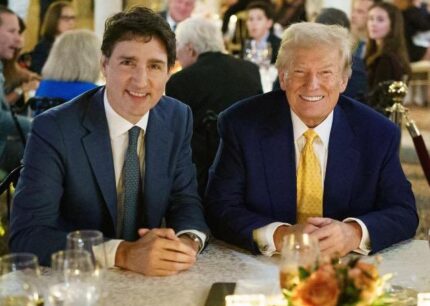Canada has announced a robust C$1.3 billion ($900 million) border security strategy aimed at addressing potential trade tensions with the United States and responding to President-elect Donald Trump’s threats of imposing 25% tariffs. The comprehensive plan comes as a direct response to Trump’s demands for stricter border control and combating illegal drug trafficking and irregular migration.
The proposed measures are strategically designed to demonstrate Canada’s commitment to border security while preserving the critical economic relationship between the two North American neighbors. Economists warn that potential tariffs could significantly impact Canada’s economic stability, making this proactive approach crucial for maintaining bilateral trade relations and economic resilience.
Enhanced Surveillance and Law Enforcement Capabilities
The five-pillar border security plan introduces unprecedented surveillance and enforcement mechanisms, including a cutting-edge aerial surveillance task force equipped with helicopters, drones, and mobile monitoring towers. Canada Border Service Agency will receive substantial funding to develop specialized dog teams for drug detection and implement advanced screening technologies at high-risk border entry points.
A particularly notable component is the proposed “joint strike force,” which will facilitate unprecedented cooperation between Canadian and US law enforcement agencies. This collaborative approach includes dedicated synthetic drug units, combined special enforcement teams, and integrated binational enforcement initiatives designed to create a more coordinated and effective cross-border security strategy.
Political Context and Diplomatic Negotiations
The announcement coincides with significant political transitions in Canada, including Dominic LeBlanc’s recent appointment as finance minister following Chrystia Freeland’s unexpected resignation. LeBlanc highlighted preliminary discussions with Trump’s incoming border advisor, Tom Homan, expressing cautious optimism about the plan’s potential reception.
Prime Minister Justin Trudeau’s recent meeting with Trump at Mar-a-Lago underscores the delicate diplomatic negotiations underlying these security measures. The Canadian government is clearly attempting to preempt potential trade sanctions while demonstrating a commitment to addressing US concerns about border security and drug trafficking.
Comparative Border Security Landscape
Despite Trump’s rhetoric, US Border Patrol data reveals that the US-Canada border experiences significantly lower levels of migrant crossings and drug seizures compared to the US-Mexico border. This context suggests that Canada’s new security measures are as much about diplomatic positioning as addressing genuine security gaps.
The comprehensive plan represents a calculated diplomatic and security strategy, balancing economic interests, national security concerns, and maintaining the historically strong relationship between the United States and Canada. By proactively addressing potential points of friction, Canada aims to protect its economic interests while meeting international security expectations.
U.S.-Canada Relations Under Scrutiny
Trump’s rhetoric and tariff threats have placed renewed attention on U.S.-Canada relations. While the northern border sees fewer irregular crossings and fentanyl seizures compared to the southern border, the issue remains a priority for both nations.
LeBlanc revealed that he had preliminary discussions with Trump’s incoming border czar, Tom Homan, regarding the new security measures. The talks were described as “encouraging” and indicative of potential collaboration. Additionally, Trudeau’s recent meeting with Trump at Mar-a-Lago highlighted the importance of maintaining strong bilateral ties.
Despite Trump’s jabs at Trudeau, Canadians largely believe the countries’ relationship remains strong. However, Trudeau’s ability to navigate these challenges while managing domestic political turmoil will be critical in shaping Canada’s future.
Political Fallout Amid Leadership Changes
The border security announcement coincides with significant political shifts in Canada. Dominic LeBlanc, a long-time ally of Trudeau, assumed the finance minister role on Monday following Chrystia Freeland’s unexpected resignation. Freeland, who also served as deputy prime minister, criticized Trudeau’s spending policies in an open letter, adding to the challenges facing his minority government.
Trudeau, addressing Liberal Party supporters at a holiday event on Tuesday, acknowledged the political hurdles, stating, “There are always tough days and big challenges in politics.” He reaffirmed his administration’s resolve to navigate these challenges, emphasizing the government’s commitment to maintaining Canada’s economic and diplomatic stability in the face of mounting pressures.
This border plan reflects a critical step in securing Canada’s economic interests while addressing U.S. demands, underscoring the high stakes involved as the Trump administration prepares to take office.














